Advent 2024 Week 1 – Hope
This week, we enter the four weeks of Advent, a time of preparation for the symbolic celebration of Jesus’s birth. The first week is about hope last year, I wrote on this, noting that the world was in an ugly state, it still is, and we still need to hold on to that hope.
This week, Christians will light the first of four candles on the Advent Wreath. This first week’s candle is known as the “prophecy candle,” and is a symbol of hope. Advent assures us we can have hope that God will fulfill the prophecies declared in the Old Testament about Jesus. Hope doesn’t disappoint us (Romans 5:5). This candle is called the “Hope” or “Prophet’s Candle,” symbolizing the anticipation of the coming Messiah and the hope that He brings to the world. The Scripture readings and prayers during this week often focus on the prophecies in the Old Testament about the promised Savior and the expectation of His arrival.
Hope Again
Briefly, hope is a spiritual practice that enhances our optimism and counters feelings of despair. “Hope is a positive and potent spiritual practice with the power to pull us through difficult times. It is usually described with light metaphors — a ray, a beam, a glimmer of hope; the break in the clouds; the light at the end of the dark tunnel. It is often discovered in unexpected places.”
The phrase I want to focus in on in the previous paragraph is “unexpected places.” The teacher Jack Kornfield is fond of reflecting on this phrase from The Tibetan Book of the Dead, “O Nobly Born, O you of glorious origins, remember your radiant true nature, the essence of mind. Trust it. Return to it. It is home.”
We are so focused on the externals of our life right now, worried about what is going to happen to us, to our nation, to our world. None of which we can control. The Stoics among others are fond of pushing us to focus on what is in our control. We can control ourselves and we can control our connections with others.
Turning inwardly, perhaps reflecting on our religious traditions, or simply reflecting on our Christ nature, we see ourselves as we really are, and we then begin to see others as they truly are (even the ones who externally are not very nice people). This begins to cultivate an interconnectedness.
Unexpectedly, we experience what Thomas Merton experienced when he exclaimed, “this sense of liberation from an illusory difference was such a relief and such a joy to me that I almost laughed out loud… I have the immense joy of being man, a member of a race in which God Himself became incarnate. As if the sorrows and stupidities of the human condition could overwhelm me, now I realize what we all are. And if only everybody could realize this! But it cannot be explained. There is no way of telling people that they are all walking around shining like the sun.”
Ubuntu
The word “ubuntu” is from some southern African languages and it literally means “humanness.” To have ubuntu is to be a person who is living a genuinely human way of life, whereas to lack ubuntu is to be missing human excellence. At its heart, Ubuntu is about being truly seen and acknowledged as whole beings through our connections with others. It’s the idea that “I am because we are,” emphasizing that our identities and well-being are intertwined with the community around us.
We are in a time of what appears to be severe division in our country and with our faith as Christians. We have become locked into a binary mindset in a world that clearly wants to see beyond the binary. Ubuntu as a practice encourages us to engage deeply with the world around us.
Ubuntu Nurtures Hope
Ubuntu acknowledges that when we come together with compassion and support, we create a nurturing environment where hope can flourish. It’s in the simple gestures of kindness, in the embrace of togetherness, that we find the strength to dream and the courage to move forward, even when circumstances seem daunting.
In practical terms, Ubuntu encourages us to be present for one another, to listen deeply, and to act with empathy. By fostering this spirit of community, Ubuntu helps us see beyond the individual challenges we face and view them within the broader tapestry of humanity’s shared journey. This collective vision bolsters hope, as we realize that we are not alone, and that together, we can work towards healing and transformation.
Ubuntu teaches us the essential practice of gratitude and recognition for those who have brought hope into our lives. By celebrating the contributions of others, we not only reinforce hope within our communities but also inspire it in ourselves. As we share stories of perseverance and triumph, we weave a narrative of hope that uplifts and unites us all.
Come Holy Spirit
The biblical sense of hope is very different. Hope, in the Bible, exists as a secure assurance, a trust placed in a trustworthy God. God has not failed us in the past, and will not fail us in the future.
Hope waits and endures. It isn’t flimsy or merely wishful thinking. It can withstand fire, trials, and despair. When we come together as a people, a Christian people focused on the mission and message of the first century Jesus and his followers, we foster hope, peace and love in the community and the world around us. We create an atmosphere where hope can flourish.
Come Holy Spirit, as we light this week’s first Advent candle, let the flame of hope not only be symbolic but be embodied by our actions in our communities this week. Guide us with the compassion and love of the Christ that resides within all of us. May it be so.













